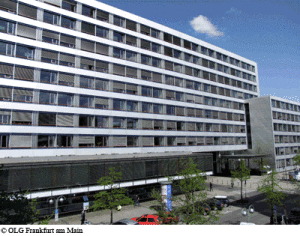 The Frankfurt Court of Appeals (Oberlandesgericht) is creating additional specialized senates (a Senat is a division of the court of appeals, sitting with three judges) as of the beginning of this year.
The Frankfurt Court of Appeals (Oberlandesgericht) is creating additional specialized senates (a Senat is a division of the court of appeals, sitting with three judges) as of the beginning of this year.
When the court’s president, Roman Poseck presented the court’s new rules on the allocation of matters (Geschäftsverteilungsplan) ealier this week, he announced that dedicated senates will be created for insolvency matters and for transportation disputes.
The Frankfurt Court of Appeals, the third largest in the county, covering the Federal State of Hesse, is continuously driving forward its specialization on the bench. In addition to the traditional specialized senates for family and criminal matters, it has had dedicated senates for banking, insurance, competition and medical malpractice disputes for quite some time, and in 2016 established two dedicated senates for construction matters. Between the two senates, they attracted 275 matters in their first year.
In addition, the Frankfurt Court of Appeals has exclusive jurisdiction for arbitration-related matters, such as recognition and enforcement of awards and setting aside proceedings. While this specialization is provided for in the Code of Civil Procedure (ZPO) and hence mandatory, the courts are relatively free to create specialized units across the spectrum of civil and commercial matters, with the patent units created in Düsseldorf probably being best known and most succesful internationally.
The courts’ powers to drive specialization are limited, however, to their own court district. They do not have, for example, the power to co-operate with adjacent courts.* The Frankfurt courts certainly have the critical size to drive specialization on the bench. Smaller courts may find it more difficult. Triggered, inter alia, by the discussions at the German Jurists Forum (Deutscher Juristentag) in 2014, proposals have been made to allow the creation of specialized units both on the first instance and on the appeal level across different court districts, for example in a 2015 legislative initiative put forward by the State of Berlin.
As far as I can tell, these ideas have not yet gained a lot of traction. There are, of course, a lot of competing interests at play – both inside the judiciary along the lines of who gains and who loses these matters, and in terms of access to justice. The smaller courts tend to be in rural areas anyway, and the question arises whether the benefit of greater specialization outweighs the costs created by the need to travel further to attend court hearings.
* The courts may co-operate in non-judicial matters. The three courts of appeal in Lower Saxony (Niedersachsen), Braunschweig, Celle and Oldenburg, announced in November 2016 that they had entered into a co-operation agreement dealing primarily with various back-office functions, as well as with the recruitment and training of judges.
***
The photo shows the court’s main building in Frankfurt. (c) Oberlandesgericht Frankfurt am Main.
